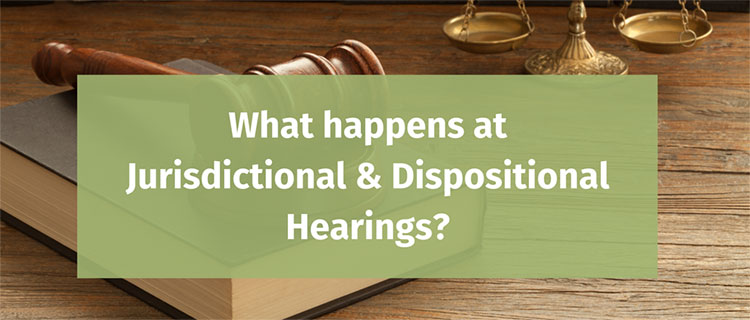
Jurisdictional and Dispositional Hearings are critical steps in the process of determining whether alleged child abuse or neglect has taken place . . . and what to do next.
If you are a parent or caregiver and you have been summoned to appear at a Jurisdictional Hearing, Child Protective Services (CPS) has received a complaint alleging abuse or neglect of a child or children in your care and they have already come to your home to investigate and remove the child or children from your care (if warranted). Subsequent to their removal, the reasons for the child or children being detained have been reviewed with you at a Detention Hearing and a judge has decided whether to move forward with the investigation and whether the child(ren) should stay with your or live with someone else until the next hearing takes place. This next hearing is called the Jurisdictional Hearing.
Jurisdictional Hearing
The Jurisdictional Hearing is where the Court decides whether the petition that has been filed by CPS is true or not.
The Court has three ways to make this determination:
- The parents or guardians admit the petition is true;
- The parents or guardians submit on the petition; or
- The parents or guardians dispute or contest the petition.
If the parents choose to dispute the petition, the court sets a trial date where all parties present evidence to the court and the court makes a decision.
If the court dismisses the petition at the Jurisdictional Hearing, the case is closed, and the child or children are returned to the care of the parent(s).
If the court decides the petition is true, the court immediately moves forward to the Dispositional Hearing.
Dispositional Hearing
At the Dispositional Hearing, the court decides whether the child or children involved will be placed back with the parent(s) or in the home of a relative, foster parent, or group home.
If the court places the child(ren) back with the parent(s), the parent(s) are generally ordered to participate in a Family Maintenance Program.
If the court does not place the child(ren) back with the parent(s), the court will order the parent(s) to participate in a Family Reunification Program, which is designed to get the child(ren) back in the custody of the parent(s).
There are some situations where CPS does not offer any type of services to the parents and instead asks to find another permanent plan for the child, such as adoption.
Family Maintenance Hearing
In those cases when the court places the child or children with one or both of the parents at the Jurisdictional/Dispositional Hearings, the court holds a Family Maintenance Hearing six months later.
At this hearing, the court looks at whether the parent or parents have completed the social services that were ordered. The court then decides based on their progress whether to continue to supervise the family. At this point, the court can close the case or continue the case for an additional six months.
Got Questions? Looking for Guidance?
When it comes to dependency law and navigating the Child Protective Services system, it’s important to protect your rights and the rights of your children. James Legal Group can meet with you free of charge, in a setting of your choosing, to discuss your options.
